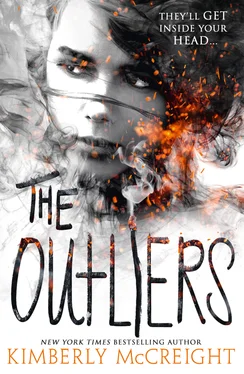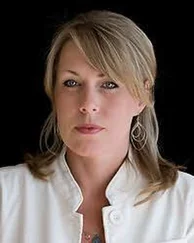“Yeah,” I say finally, because he’ll probably use me being angry as more proof that we shouldn’t be helping Karen. “I’m awesome.”
But the whole way upstairs, I still try to think of an excuse not to give Karen the shoes. One that doesn’t seem crazy. One that my mom would approve of. Because my mom would want me to give Karen whatever she needs. You can do it, she’d say if she was there. I know you can.
Soon enough, Karen is behind me in my parents’ room as I stand frozen in front of their closet. We’re only lending them, I remind myself, as I pull open the closet door and crouch down in front of my mom’s side of the closet. I close my eyes and try not to take in her smell as I feel around blindly for her shoes. Finally, my hands land on what I think are a pair of low dress boots that my mom only wore once or twice. But I feel sick when I open my eyes and see what I’ve pulled out instead. My mom’s old Doc Martens, the ones she loved so much she had the heels replaced twice.
“I know Cassie misses you,” Karen says while I’m still bent over my mom’s Doc Martens like an animal protecting its last meal. “Because I still know how she really feels. Even if she thinks I don’t. And I know that right now, Cassie’s totally lost and what she really needs is a good friend. A friend like you.”
Karen comes over and kneels next to me. I feel her look from me to the boots and back again. Then she leans forward and reaches into the closet herself. A second later, she pulls out a pair of bright-white, brand-new tennis shoes. The ones that my grandmother—my dad’s mom—gave to my mom years ago, probably because my mom always hated tennis.
“What about these instead?” Karen asks.
Yes, I would say if I wasn’t so afraid my voice would crack. Those would be much, much better.
“Do you think Cassie at least knows how much I love her?” Karen asks, rocking back to sitting, her eyes still on the sneakers. “Because things haven’t been easy between us lately. Let’s face it, they’ve never been easy. And I know I’ve made a lot of mistakes. I could have done so many things, so much better. But I was always trying. And I really do love her. She knows that, right?”
Cassie has said so many awful things about her mom—selfish, self-involved, fat-shaming, judgmental, superficial. But the thing that Cassie said most often was that she didn’t think Karen loved her. Not in the way a mom should.
“Yeah,” I say, before I wait too long and it sounds like the lie that it is. “Cassie knows that, definitely.”
“Thank God.” Karen sounds so relieved that it kind of breaks my heart for her. “That’s really—that’s good.”
Karen puts the sneakers down, then reaches over to take my hand in hers, rubbing my knuckles in a mom-ish way that makes my throat squeeze tight. Her other hand moves to the hacked remains of my wavy brown hair, her fingers drifting away before they reach its most jagged ends.
The night before I’d glimpsed myself in the hallway mirror and for a second—one fucked-up second—I thought I was her. My mom. That she was there, warm and alive and well again. With my hair longer, I was starting to look exactly like her. And last night I needed not to. I needed to know I’d never again mistake myself for her. Never again would I believe for one awfully beautiful moment that she had come home.
So I grabbed the scissors and leaned over the bathroom sink to cut my hair. So that it, that I, looked nothing like her. I nailed the different part. That’s for sure. I’d been avoiding mirrors ever since, but I could tell it was bad from the freaked-out look that had passed over my dad’s face when he first saw me. But even worse, actually, was the way Gideon—always up for making me feel bad—didn’t say a word.
When I look up at Karen, she smiles, her eyes glistening as she wraps a hand gently around my head and pulls it to her neck. And I’m pretty sure it’s because she needs to be holding someone. Even more, maybe, than I need to be held. She strokes my hair. Don’t cry, I tell myself as my eyes start to burn. Please don’t cry.
“You’re going to be okay, you know,” she whispers. “Not now, but someday.”
When Karen and I get back downstairs, my dad is just hanging up the phone. But instead of putting it down, he keeps it gripped in his hand, so tight his fingers are white at the edges. Something is wrong. Something new. Something bad on top of whatever is wrong with Cassie.
“What did Dr. Simons want?” I ask, because it was the conversation with him that freaked my dad out apparently.
Dr. Simons was my dad’s professor at Stanford. He’s a psychologist and a professor like my dad, but he studies peer pressure, not EI. Similar enough, I guess. And he has no family of his own anymore, so my dad is like his surrogate son. He’s always off teaching this place or that—England, Australia, Hong Kong—which is why we haven’t seen him since we were super-little kids. Lack of geographical proximity is probably part of what my dad likes about Dr. Simons. They are as close as two people, forever thousands of miles apart, can possibly be.
“He was just calling back to answer a question, something about my new data.” My dad waves a hand: nothing for you to worry about . And I so want to find that believable. But it is not. At all. My dad forces a bigger, even less convincing smile as he turns to Karen. “We ready? Wylie, just be sure to lock up once we’re gone, okay?” He says it casually, like it’s an ordinary, everyday request.
“Lock up?” I ask.
My dad has never thought to lock a door in his entire life. If it hadn’t been for my mom, he would have left for our annual two-week vacation on the Cape with our front door hanging wide open.
“Wylie, please,” my dad snaps, like he’s fed up with me and my obsessing, and fair enough, I guess. “Just lock the door. Until we know what’s happened to Cassie, I just—we should exercise all due care.”
That explanation would be a lot more believable if he didn’t look so freaked out. He hasn’t looked that spooked in ages. Not since the day the first baby came.
We were at the breakfast table a couple of days after Halloween when my mom found the first one. It was sitting there on our front porch when she went out to get the newspaper.
“I guess they get points for creativity,” my mom said as she came inside, holding up a plastic baby doll. Her nose crinkled as she peered at the red splattered all over it, which one could only hope was paint. “Much more vivid than the usual emails. I guess that’s the price you pay for page one. I should probably call Elaine and see if she got one, too.”
Elaine was the journalist my mom had been working with on a story about a coalition bombing in Syria. It had run that day on the front page of the Sunday Times , and it was my mom’s photographs of a bombed-out school that had stolen the show. She had always gotten her fair share of hate mail. A couple of times even left at our house. But nothing like a plastic baby.
“Why are you even touching that!” my dad shouted. And so loud. “Put it back outside!”
“It’s not contagious, honey.” My mom smiled her beautiful, mischievous smile and raised an eyebrow. She was going to let the shouting go, apparently. She’d been doing that a lot lately—letting everything with my dad go—but I could tell she was starting to get annoyed. “You’ve got to keep your sense of humor, Ben. You know that.”
And my dad did used to have a sense of humor. He used to be really, really funny actually. In a way, that was even funnier, because of his whole stiff science-guy thing. But these days, he was so wound up. First, because he’d been working around the clock at the university trying to finish his study, then I guess his results were kind of disappointing. It wasn’t going to be officially published until February, but it was already finished. The icing on the cake, though, was him having to fire his favorite postdoc, Dr. Caton, because—according to my dad—he’d let “personal bias cloud his judgment.” Whatever that meant. We’d never met Dr. Caton—my dad wasn’t big on socializing—but from the day he hired him, he’d talked about the supposedly very young Dr. Caton (twenty-four and already with a PhD) like some kind of precious, unearthed jewel. I didn’t care, but it drove Gideon—our other resident science boy wonder—totally crazy. He was delighted when Dr. Caton got the ax.
Читать дальше












